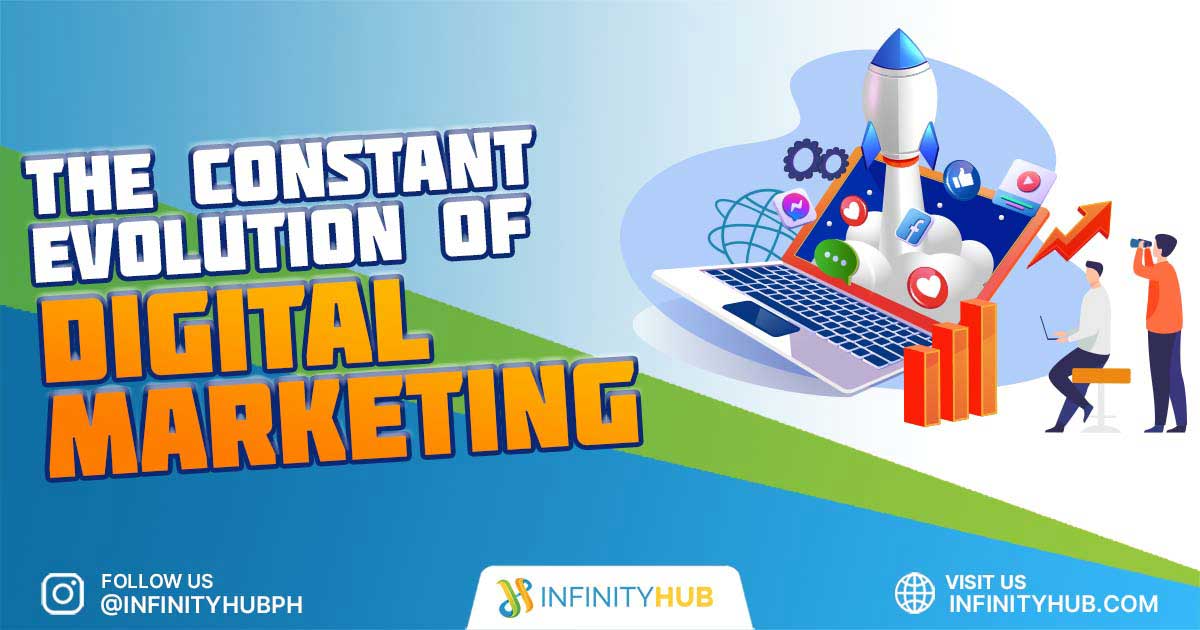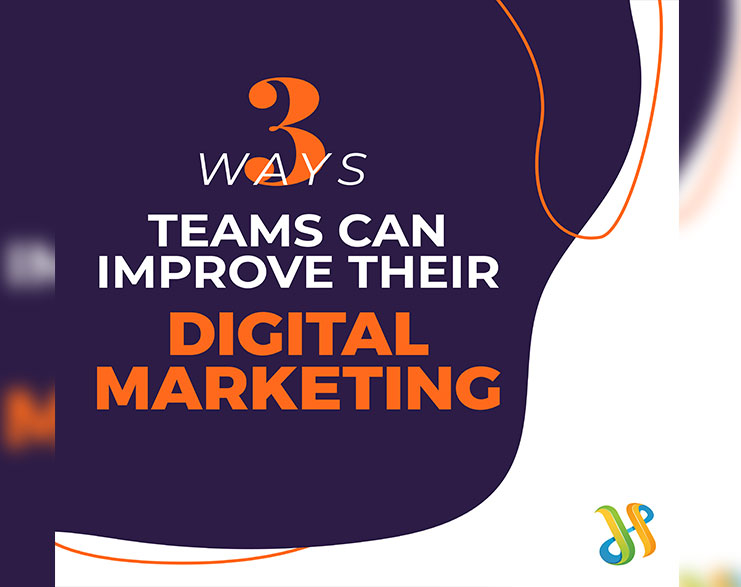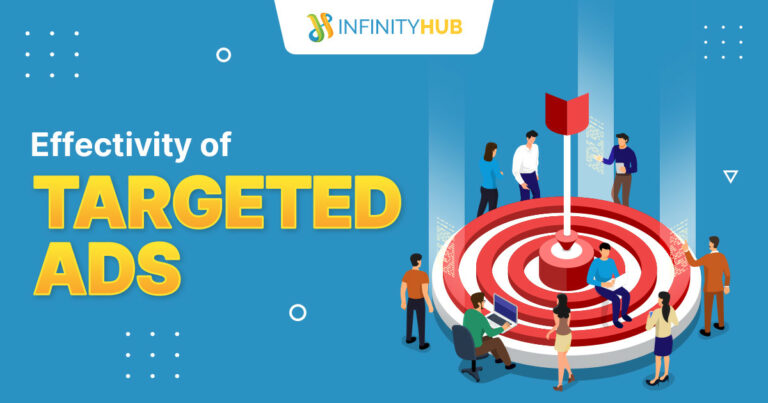The constant evolution of Digital marketing has constantly evolved from traditional marketing since the inception of the World Wide Web. The digital marketing industry has witnessed many changes, and with the emergence of new technologies and devices, it has continued to grow. As a result, businesses have had to adapt their marketing strategies to remain competitive in the digital marketing world. Infinity Hub Digital Marketing Agency has been at the forefront of this evolution, helping businesses to develop and implement effective digital marketing strategies. In this blog post, we will explore the development of digital marketing and how Infinity Hub Digital Marketing Agency has kept up with the changes.

The Emergence of Search Engines
Search engines were the first significant change in the digital marketing world. Introducing search engines such as MSN Search Engine allowed businesses to optimize their websites for search engine traffic. Search Engine Optimization (SEO) has become crucial to any digital marketing strategy. Infinity Hub recognizes the importance of SEO early on and has since helped businesses improve their search engine rankings and drive website traffic. It has brought rise to what is known as Search Engine Marketing (SEM), promoting websites and blogs by increasing their visibility through strategies such as Search Engine Optimization (SEO) and paid advertising.

The Rise of Social Media Platforms
The social media platform just went wild with the introduction of Facebook, LinkedIn, Twitter, Instagram, and Pinterest. Social media platforms have changed the way businesses interact with their customers. With the increasing number of internet users on social media platforms, social media marketing has become an essential part of any digital marketing strategy. Social media platforms allow businesses to engage with their target audience and build brand awareness. Infinity Hub Digital Marketing Agency has helped companies to develop effective social media marketing campaigns to engage with customers and build their online presence.

The Mobile Revolution
With the widespread use of mobile phones and personal computers, businesses have had to adapt their digital marketing strategies to reach customers on multiple devices. Mobile devices have become an essential part of our daily lives, and companies need to prioritize mobile optimization to ensure that their websites are accessible on mobile devices. Infinity Hub Digital Marketing Agency has helped businesses optimize their websites for mobile devices, ensuring they reach their target audience regardless of their device. The smartphone supported email, text messaging, phone calls, and the internet but targeted business professionals.

The Evolution of Digital Channels
Digital channels have continued to evolve, with new platforms emerging regularly. Traditional marketing methods, such as print advertisements, are becoming less effective, and businesses need to explore new digital channels to reach their target audience. Infinity Hub Digital Marketing Agency has helped companies to identify new digital media and develop effective marketing campaigns to reach their target audience.

The Emergence of Consumer Data and Customer Relationship Management
Consumer data has become an essential part of any digital marketing strategy. With the emergence of Customer Relationship Management (CRM) tools, businesses can collect and analyze consumer data to improve their marketing strategies. Infinity Hub Digital Marketing Agency has helped companies to leverage consumer data to develop personalized marketing campaigns and improve their marketing efforts.

The Shift from Conventional Marketing Methods
The digital era has shifted from conventional marketing methods to online marketing. Businesses have had to adapt their marketing strategies to remain competitive in the digital marketing world. Infinity Hub recognizes this shift early on and has helped companies to develop effective digital marketing strategies aligning with their business goals. People have moved on to tablets, phones, and computers, which are the areas where digital marketers have gained the most ground. Your digital marketing campaigns can help you reach and sell them long-term.

The Importance of Content Marketing
Content marketing has become an essential part of any digital marketing strategy. Businesses must create valuable and relevant content to attract and engage their target audience. Infinity Hub Digital Marketing Agency has helped companies to develop compelling content marketing strategies to drive website traffic and increase their online presence.
Conclusion
In conclusion, digital marketing has evolved significantly, and businesses have had to adapt their marketing strategies to remain competitive. Infinity Hub Digital Marketing Agency has been at the forefront of this evolution, helping companies to develop and implement effective digital marketing strategies. As digital marketing professionals, Infinity Hub Digital Marketing Agency understands the importance of staying up-to-date with the latest digital marketing trends and technologies to deliver the best results for their clients.
FAQ:
How has digital marketing evolved over the years?
Digital marketing has undergone significant evolution over the years, driven by advances in technology, changes in consumer behavior, and new channels for reaching audiences. Here are some of the key ways in which digital marketing has evolved:
1. Increased use of data: With the rise of big data and analytics tools, marketers have more access to customer data than ever before. This has enabled them to personalize their marketing messages and target specific audiences more effectively.
2. Shift towards mobile: The widespread adoption of smartphones and other mobile devices has shifted the focus of digital marketing towards mobile-friendly content and responsive design.
3. Growth of social media: Social media platforms like Facebook, Twitter, and Instagram have become key channels for digital marketing, offering new ways for brands to engage with customers and build relationships.
4. Emergence of video: Video has become an increasingly important medium for digital marketing, with platforms like YouTube and TikTok attracting huge audiences.
5. Rise of influencer marketing: Influencer marketing has emerged as a powerful new way for brands to connect with customers, leveraging the power of social media influencers to promote their products and services.
Overall, digital marketing has become more sophisticated and data-driven, with new channels and techniques constantly emerging. Marketers who stay on top of these trends and adapt their strategies accordingly are more likely to succeed in today’s fast-paced digital landscape.
Why digital advertising is constantly changing?
Digital advertising is constantly changing due to a variety of factors, including advances in technology, changes in consumer behavior, and shifting industry trends. Here are some of the key reasons why digital advertising is always evolving:
1. Advances in technology: New technologies and platforms are constantly emerging, offering new opportunities for digital advertising. For example, the rise of artificial intelligence (AI) and machine learning (ML) has enabled more sophisticated targeting and personalization.
2. Changes in consumer behavior: Consumer behavior is constantly evolving, and digital advertisers need to adapt their strategies accordingly. For example, the rise of ad-blocking software has forced advertisers to rethink their approach to display advertising.
3. Increasing competition: As more businesses embrace digital advertising, competition for ad space and consumer attention is becoming increasingly fierce. This is driving advertisers to constantly innovate and find new ways to stand out.
4. Shifting industry trends: The digital advertising industry is constantly evolving, with new trends and best practices emerging all the time. Advertisers need to stay on top of these trends and adapt their strategies accordingly in order to stay competitive.
Overall, digital advertising is constantly changing in response to a wide range of factors. Advertisers who stay on top of these changes and are willing to adapt their strategies are more likely to succeed in today’s fast-paced digital landscape.
What is the evolution of marketing over time?
Marketing has undergone significant evolution over time, driven by changes in technology, consumer behavior, and the competitive landscape. Here are some of the key ways in which marketing has evolved over the years:
1. Product-centric to customer-centric: In the past, marketing was primarily focused on promoting products and features. Today, successful marketers focus on understanding their customers’ needs and preferences, and delivering solutions that meet those needs.
2. Mass marketing to targeted marketing: In the past, marketers relied on mass media to reach large audiences. Today, advances in data and analytics have enabled more targeted and personalized marketing campaigns.
3. Offline to online: With the rise of the internet and digital technologies, marketing has shifted from traditional offline channels (such as print, radio, and TV) to online channels (such as search engines, social media, and email).
4. One-way communication to engagement: In the past, marketing was often a one-way communication channel, with brands broadcasting messages to their audiences. Today, successful marketers focus on engagement, creating two-way conversations with customers and building long-term relationships.
5. Brand-focused to value-focused: In the past, marketing was often focused on building and promoting a brand image. Today, successful marketers focus on delivering value to customers, whether through innovative products, exceptional customer service, or other means.
Overall, marketing has evolved from a product-centric, one-way communication channel to a customer-centric, engagement-focused discipline. Marketers who stay on top of these trends and adapt their strategies accordingly are more likely to succeed in today’s fast-paced business environment.
What is the growth of digital marketing?
Digital marketing has experienced tremendous growth in recent years, driven by a combination of factors including the increasing use of technology, changes in consumer behavior, and the growing importance of online channels for businesses. Here are some of the key drivers of the growth of digital marketing:
1. Increasing internet penetration: With more people accessing the internet than ever before, digital marketing has become an essential channel for reaching consumers.
2. Mobile adoption: The widespread adoption of smartphones and other mobile devices has further accelerated the growth of digital marketing, as consumers increasingly use these devices to search for products and services, make purchases, and interact with brands.
3. Data and analytics: Advances in data and analytics tools have made it easier for marketers to measure and optimize the performance of their digital campaigns, driving greater ROI and fueling further investment in the channel.
4. Social media: Social media platforms like Facebook, Instagram, and Twitter have become key channels for digital marketing, offering new ways for businesses to connect with consumers and build relationships.
5. E-commerce: The growth of e-commerce has also fueled the growth of digital marketing, as businesses seek to drive online sales and build brand awareness through digital channels.
Overall, the growth of digital marketing shows no signs of slowing down, as more businesses continue to invest in online channels and consumers increasingly rely on the internet for their purchasing decisions.
What are the benefits of digital marketing?
Digital marketing offers a wide range of benefits for businesses of all sizes. Here are some of the key advantages of digital marketing:
1. Increased reach: Digital marketing enables businesses to reach a wider audience than traditional marketing channels, as it allows them to target specific demographics, interests, and behaviors.
2. Greater flexibility: Digital marketing campaigns can be adjusted and optimized in real-time, allowing businesses to quickly respond to changing market conditions and customer needs.
3. Lower costs: Digital marketing campaigns are often more cost-effective than traditional marketing channels, as they allow businesses to reach a larger audience at a lower cost per impression.
4. Improved targeting: With digital marketing, businesses can target specific audiences based on factors such as demographics, interests, and behaviors, making their campaigns more effective and efficient.
5. Increased engagement: Digital marketing campaigns can be designed to engage and interact with customers in a variety of ways, from social media posts to email newsletters, helping to build relationships and foster brand loyalty.
6. Greater insights: Digital marketing provides businesses with a wealth of data and analytics that can be used to measure the effectiveness of their campaigns and make informed decisions about future marketing efforts.
Overall, digital marketing offers a powerful set of tools and techniques for businesses looking to connect with customers, build brand awareness, and drive sales and growth.
Who is the father of digital marketing?
The concept of digital marketing can be traced back to the early days of computing and the internet, but it was not until the 1990s that the term “digital marketing” began to be widely used. While there is no single person who can be credited with “inventing” digital marketing, there are a number of individuals who have played key roles in its development and popularization over the years.
Some of the most influential figures in the history of digital marketing include:
1. Guglielmo Marconi: The Italian inventor and electrical engineer is widely considered to be the father of radio, which paved the way for modern broadcasting and advertising.
2. Ray Tomlinson: The American computer programmer is credited with inventing email in 1972, which has since become one of the most important tools in digital marketing.
3. Gary Thuerk: The American marketer is often credited with sending the first email marketing campaign in 1978, which helped to establish email as a key channel for digital marketing.
4. Tim Berners-Lee: The British computer scientist is credited with inventing the World Wide Web in 1989, which provided the foundation for the modern internet and digital marketing.
Overall, while there is no single “father of digital marketing,” the field has been shaped by the contributions of many individuals over time, each of whom has played a role in advancing the technology and techniques used in digital marketing today.
Types of digital marketing
There are many different types of digital marketing, each with its own unique characteristics and benefits. Here are some of the most common types of digital marketing:
1. Search Engine Optimization (SEO): SEO is the process of optimizing a website or web page to rank higher in search engine results pages (SERPs) for specific keywords and phrases.
2. Pay-Per-Click Advertising (PPC): PPC advertising involves placing ads on search engine results pages or other websites and paying a fee each time someone clicks on the ad.
3. Social Media Marketing: Social media marketing involves using social media platforms like Facebook, Twitter, and Instagram to promote a brand, engage with customers, and build relationships.
4. Content Marketing: Content marketing involves creating and sharing valuable content, such as blog posts, videos, and infographics, with the goal of attracting and engaging a target audience.
5. Email Marketing: Email marketing involves using email to communicate with customers and prospects, typically with the goal of promoting products or services or building relationships.
6. Affiliate Marketing: Affiliate marketing involves promoting other people’s products or services and earning a commission on each sale.
7. Influencer Marketing: Influencer marketing involves partnering with social media influencers to promote a brand or product to their followers.
8. Video Marketing: Video marketing involves creating and sharing video content, such as ads, product demos, and how-to guides, with the goal of engaging and educating a target audience.
Overall, there are many different types of digital marketing, each with its own strengths and weaknesses. A successful digital marketing strategy will typically involve a mix of different tactics, tailored to the unique needs and goals of the business or organization.
What is digital marketing?
Digital marketing refers to the practice of using digital channels and technologies to promote a product or service and connect with customers. Digital marketing encompasses a wide range of tactics and techniques, including search engine optimization (SEO), pay-per-click advertising (PPC), social media marketing, content marketing, email marketing, affiliate marketing, influencer marketing, and video marketing, among others.
The goal of digital marketing is to reach a target audience and engage with them in a way that drives traffic, leads, sales, or other desired outcomes. Digital marketing offers businesses a number of advantages over traditional marketing channels, including the ability to target specific demographics and interests, track and measure results in real-time, and optimize campaigns for maximum impact.
Successful digital marketing strategies are typically tailored to the unique needs and goals of the business or organization, and may involve a mix of different tactics and channels. The field of digital marketing is constantly evolving, driven by advances in technology, changes in consumer behavior, and emerging trends and best practices.
Why does digital marketing matter?
Digital marketing matters for a number of reasons, including the following:
1. Increased Reach: Digital marketing enables businesses to reach a larger audience than traditional marketing channels, as it allows them to target specific demographics, interests, and behaviors.
2. Greater Flexibility: Digital marketing campaigns can be adjusted and optimized in real-time, allowing businesses to quickly respond to changing market conditions and customer needs.
3. Lower Costs: Digital marketing campaigns are often more cost-effective than traditional marketing channels, as they allow businesses to reach a larger audience at a lower cost per impression.
4. Improved Targeting: With digital marketing, businesses can target specific audiences based on factors such as demographics, interests, and behaviors, making their campaigns more effective and efficient.
5. Increased Engagement: Digital marketing campaigns can be designed to engage and interact with customers in a variety of ways, from social media posts to email newsletters, helping to build relationships and foster brand loyalty.
6. Greater Insights: Digital marketing provides businesses with a wealth of data and analytics that can be used to measure the effectiveness of their campaigns and make informed decisions about future marketing efforts.
Overall, digital marketing has become an essential part of any successful marketing strategy, as it enables businesses to connect with customers, build brand awareness, and drive sales and growth in today’s fast-paced digital landscape.




